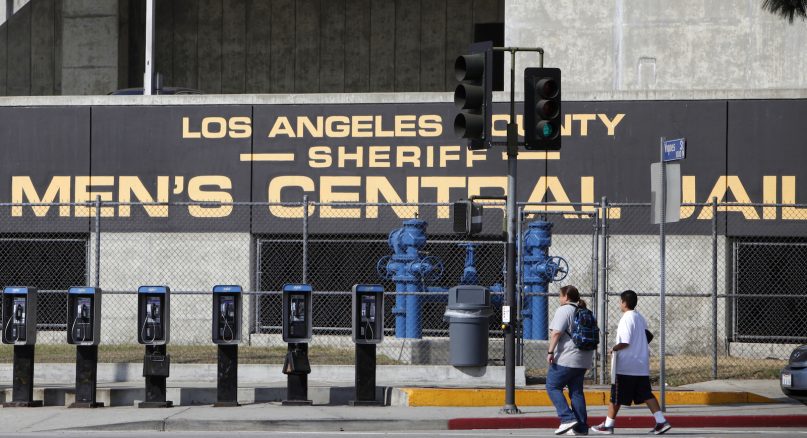LOS ANGELES (RNS) — The Los Angeles County Sheriff’s Department is being sued by three Muslim inmates who said they were denied access to religious services and meals in keeping with their practices even after having to answer a series of questions to prove their Islamic faith.
The lawsuit, filed Monday (Aug. 26) by the Council on American-Islamic Relations, argues the Sheriff’s Department “imposed policies and procedures that either completely deny Muslim inmates access to most, if not all, religious accommodations, services, programming and materials that are available to inmates of other faith, restrict their access, or require them to jump through hoops to obtain them.”
The three men said Men’s Central Jail staff failed to schedule Friday prayer or Islamic study classes but incorporated religious gatherings for inmates of other faiths, according to the lawsuit. Bible study classes, for example, were offered once a week for Christian inmates.
Staff also restricted access to copies of the Quran and prayer rugs and required the inmates to submit to “intrusive and unlawful inquiry” to prove their knowledge of Islam in order to be added to a halal diet, according to the lawsuit.
Sheriff’s Deputy Lillian Peck said the department has “neither received the lawsuit on behalf of CAIR-LA, nor are aware of the nature of its content.”
Patricia Shnell, a civil rights attorney with CAIR-LA, told Religion News Service the organization learned about these issues after two of the three inmates contacted CAIR by mail.
Shnell said the men have been denied “basically all religious accommodations while in jail.”
The lawsuit also challenges a Sheriff’s Department policy requiring special custody inmates to strip to their underwear as a condition of access to the law library. CAIR advocates say this violates the inmates’ religious beliefs regarding modesty.
“Taken together, each of these serious infringements on their ability to practice their religion amount to a complete and systemic denial,” Shnell said.
According to the lawsuit, Joe Alfred Taylor III submitted a number of requests and grievances for a halal diet between February and September of 2017, a number of which went unnoticed or were rejected. In late July 2018, Taylor went on a hunger strike in protest. Soon after, Taylor said, he was quizzed on his knowledge of Islamic faith. A chaplain asked him questions about the pillars of Islam and the location of Mecca. He briefly received halal meals, but the authorization was later revoked.
Miguel Arciniega and Hugo Cortez experienced similar treatment before their halal diet was approved, according to the lawsuit. Days after converting to Islam in November 2018, Arciniega filed his first request for a halal diet. In December, Arciniega was tested to “determine whether or not he is a Muslim,” according to the lawsuit. He said he was asked why he converted to Islam, among other questions.
Cortez’s request for a halal diet was approved after he was quizzed, but he was tested again about three months later when a staff member said “Cortez is Mexican and Mexicans are not Muslim.” Cortez answered the questions with correct Arabic terminology but was then ordered to provide the answers in English, because, the staffer said, “We’re in America and we don’t speak Arabic here,” according to the lawsuit.
The three men are still in custody, Shnell said.
Arciniega is charged with attempted murder in connection with assaults directed by the Mexican Mafia in Los Angeles County jails, according to the Los Angeles County District Attorney’s Office. Shnell said she does not have information on the charges the men are facing, “as they are not relevant” to their civil claims.
The federal Religious Land Use and Institutionalized Persons Act limits the ability of state prisons to impose substantial burdens on the religious exercise of inmates, according to the lawsuit.
However, the issue still persists.
In a July 2019 report, Muslim Advocates, a national civil rights organization, found that many state departments of correction have policies that are “outdated” or “non-accommodating of Muslim prisoners.”
As part of the report, Muslim Advocates compiled 163 recent Muslim prisoner lawsuits over a 15-month period and found that the larger share of cases — 12 percent — came from California.
“The prevalence of California cases suggests a lack of accommodating policies, a large absolute number of Muslim prisoners, or both,” the report found.
The most common complaint dealt with difficulties obtaining a religious diet, the report found.
Shnell said CAIR wants to ensure Men’s Central Jail complies with federal law and the U.S. Constitution.
“Our nation’s commitment to religious liberty must extend to the sincere practice of faith by prisoners,” Shnell said.





